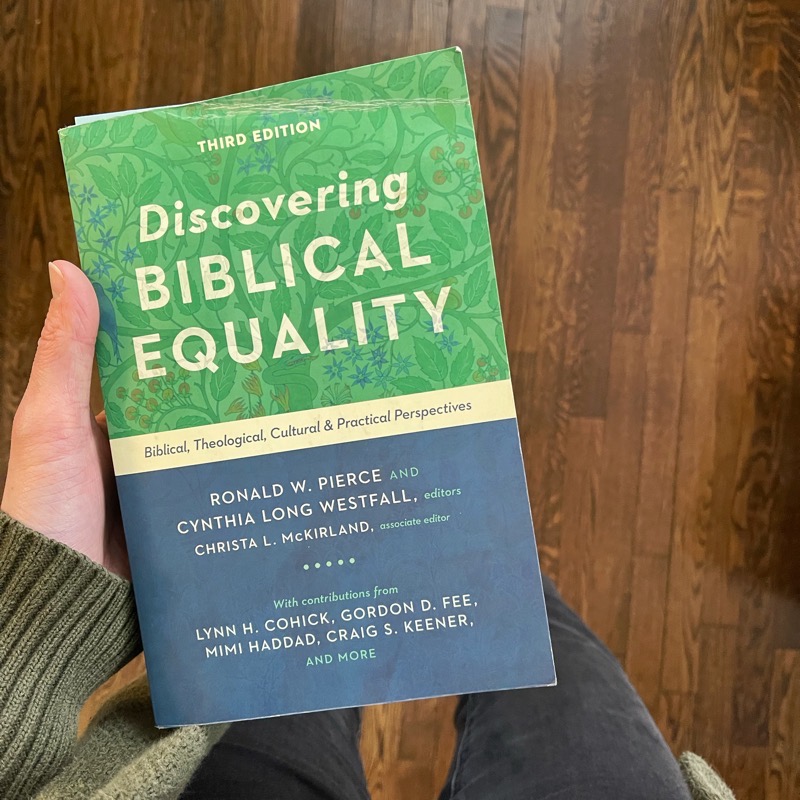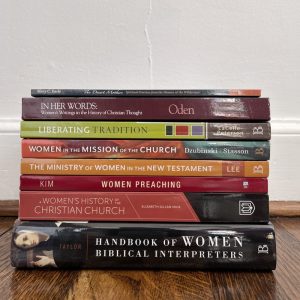Reviewing Discovering Biblical Equality
This year, I’m planning to work my way through the newest edition of Discovering Biblical Equality. It’s a 600+ page tome, a collaborate work by scholars who believe “that the Bible is the fully inspired and authoritative Word of God, and that it teaches a holistic theology of gender equality in both status and function in home, church, and society.”

As I read it, I’m going to write a short reflection on each chapter. This is good for me because it forces me to form a response to the work. I’m curious to see what shape these reflections will take over the course of the book. I hope it’s also good for you because you get the general idea of the work without reading 600 pages. Of course, if you want to grab it and read it too, I’d be thrilled.
*Note: I’m not going to footnote this because this is a blog post and you can easily find all the material in the chapter cited in Discovering Biblical Equality.*
The first chapter is written by Dr. Mimi Haddad, who was one of my professors last quarter at seminary. I took her class “Women in Church History and Theology” and this chapter was an echo of much of our work there. The chapter is titled “History Matters: Evangelicals and Women.” I grew up in a Baptist church and I’m grateful for my Baptist heritage. I learned to honor the word of God. They loved me and I knew it. However, Baptists are not known for a focus on church history. Learning church history has strengthened by faith and church history is layered with women.
Not as many women as men, of course, which is understandable when women have been denied education for much of history and been viewed as ontologically inferior to men. (Ontological refers to being, essence. For much of history, the world and the church has believed that women are by nature inferior to men. That’s the historic stance of the church about women actually.) Because of this, even places that focus on church history often tell a story of only men. We can do better and for the sake of the flourishing of the church and the honoring of the story of God’s people, we should do better.
Women were martyred for their faith: Perpetual, Blandina, Crispina. Women led monastic movements, funded projects, translated Scripture. Women wrote theological works, corrected corrupt clergy, counseled people in power, and spoke out against injustice. After the Reformation, women defended Protestantism: Argula von Grumback, Lane Jane Grey, Anne Askew. The latter two were also killed for refusing to recant. In the US, women led church movements, spoke out for women’s equality, defended their calls to preach. Women launched missions movements, fought for abolition, started orphanages and churches. We should all know the stories of Lottie Moon, Amanda Berry Smith, Dora Yu, Sojourner Truth, Sarah Grimké, and Pandita Ramabai. We should, but we usually don’t.
Why aren’t we all familiar with these women then? Haddad points out that as the movements started by women “became institutionalized, women were pressed out of leadership.” (This is a main point in Women in the Mission of the Church as well.) After 1950, “evangelical women could preach, teach, plant churches, and train men on mission fields, but never in their sending churches in the West.” This is the history of the church but currently it’s our turn to participate in writing a chapter. We can choose to highlight these women and walk in their footsteps.
There is enough resistance to women’s leadership in the church that it appears each generation of women will have to work through this topic for themselves. Hopefully as more and more women are writing and studying and publishing, the generations of women coming after us will realize they are next in a long line of women who have publicly lead the church.
Here are some more resources for you to dig into if you are interested in the women in church history.

Liberating Tradition by Kristina LaCelle-Peterson
In Her Words, edited by Amy Oden
Women in the Mission of the Church by Leanne Dzubinski and Anneke Stasson
The Ministry of Women in the New Testament by Dorothy Lee
Handbook of Women Biblical Interpreters, edited by Marion Ann Taylor
A Women’s History of the Christian Church by Elizabeth Gillian Muir
Women Preaching by Eunjoo Mary Kim
The Desert Mothers by Mary Earle
Other writings:
Here is an Instagram post where I discuss the women who have formed me.
Here’s another post where I reflected on how women form our faith.
And a newsletter about women theologians.
Also a post featuring one of those books listed above!
